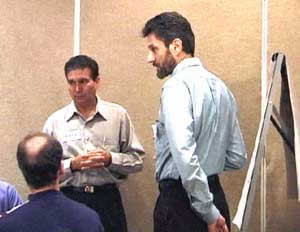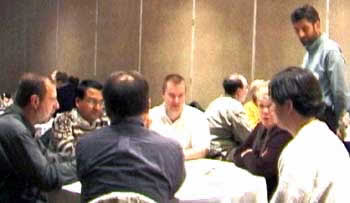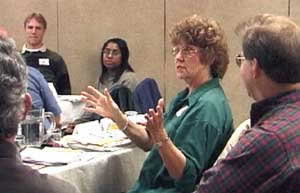| Personal Development Assessments for Managers, Employees & Teams |
|
Each assessment includes a 20-30 page report designed to provide insights and action plans for change. When integrated into a seminar or series of seminars, these assessments become powerful and effective tools for changing behavior and achieving organizational effectiveness. Please visit our DISC Training Workshops (www.disctrainingworkshops.com) website for more information.
|
Employee-Manager Assessment This assessment gives valuable information to the employee, the manager and the work team. It clarifies individual work-styles, how styles affect job performance, and how the employee-manager relationships affect productivity and goal achievement. Executive Assessment Designed for CEO's, Managers and Decision-Makers, this assessment provides an accurate analysis of the executive's strengths and value to the organization, and provides knowledge that enables them to negotiate a communication system that produces more effective work teams. Communication Style Assessment This assessment enhances the communication process with any group, through an understanding of an individual's own communication style. The report includes a section on Communication Flexibility, and details Situational Strategies that develop group communication. An Action Plan designates specific communication goals. Sales Management Assessment A sales management assessment allows sales managers to increase success by hiring the "right" people, and by motivating new and existing salespeople to perform at their best. It takes the guesswork out of managing salespeople, and allows companies to develop sound relationships through individual management plans. Sales Skills Assessment Geared specifically towards salespeople, this report takes into account the crucial differences between the salesperson and other groups of employees. It provides sales managers with information on an individual's style of selling, and on overcoming objections, closing, and servicing accounts. Sales Strategy Assessment A sales strategy assessment covers the full range of the sales process: Prospecting, First Impressions, Qualifying, Demonstration, Influence and Closing. This assessment identifies the sales-knowledge areas needed to sell a specific product or service in a given market. It identifies the specific training or management needs of a salesperson or an entire sales force. Customer-Service Assessment A customer-service assessment is designed to allow employees having any contact with customers to learn more about themselves, and to learn how certain customers will react to their natural communication style. This increased knowledge will help employees build rapport and provide more successful customer service.
This assessment targets key information necessary to build effective teams. Through individual reports, each team member clearly perceives how he/she contributes to the organization, and gains a greater appreciation of how differing styles are required to achieve team goals. Time Management Assessment Identifying specific time-wasters that impact individual productivity, and their possible causes, a time management assessment offers possible solutions for correcting or eliminating these time-wasters. It allows individuals the opportunity to develop a powerful new approach to organizing, monitoring and managing their time. 360° Feedback Assessment This assessment gathers information from several people about an individual's effectiveness. It provides the manager/employer with the unique opportunity to see him/herself through the eyes of others. The 360° assessment identifies areas in which a person is performing above or below the standards of his/her boss, self, peers and even customers. Personal Interests, Attitudes and Values Assessment This assessment allows individuals to understand how values affect their choices, helping them provide purpose and direction in their lives. It helps illuminate those motivating factors and attitudes, and allows a person to understand the driving forces behind their decisions. Work Environment Assessment Successful performance is quite often directly related to matching a person's natural behavior with the behavior demanded by a specific job. This assessment allows the individual to identify and compare her/his perceptions with reality. Relationship Insights Assessment Our ability to interact effectively with others often spells the difference between success or failure in relationships. Before we can understand others, however, we must under- stand ourselves. The relationship insights assessment was designed to provide this understanding. It identifies key behavioral areas in order to develop a more accurate self-understanding.
|
 |
Email: info@rogerreece.com |
1425 Market Blvd, Suite
530-250 • Roswell, GA 30076 (Atlanta)
• 770-642-9298
© Copyright 2017, Roger Reece Seminars, all rights reserved |
 |

 Team
Effectiveness Assessment
Team
Effectiveness Assessment